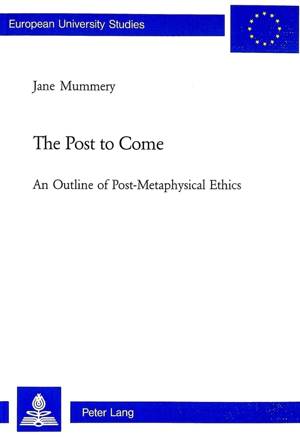
Door een staking bij bpost kan je online bestelling op dit moment iets langer onderweg zijn dan voorzien. Dringend iets nodig? Onze winkels ontvangen jou met open armen!
- Afhalen na 1 uur in een winkel met voorraad
- Gratis thuislevering in België vanaf € 30
- Ruim aanbod met 7 miljoen producten
Door een staking bij bpost kan je online bestelling op dit moment iets langer onderweg zijn dan voorzien. Dringend iets nodig? Onze winkels ontvangen jou met open armen!
- Afhalen na 1 uur in een winkel met voorraad
- Gratis thuislevering in België vanaf € 30
- Ruim aanbod met 7 miljoen producten
Zoeken
Omschrijving
Typically, when utilised in the general terms of a post-metaphysics, the 'Post' is seen as unsympathetic to ethics.
In contrast, this author proposes that the trajectory for a post-metaphysical ethics can be traced from the work of Martin Heidegger. Despite demonstrating that certain projects of the 'Post' have reached an impasse, she argues that other such possibilities do develop an outline for an ethical 'Post' that does not collapse into paradox or remain at an impasse, further suggesting that this vision of the 'Post' holds positive significance and implications for our conceptions of ethics and ethical practice in the 21st century.
Drawing in detail on both Heidegger's oeuvre and a wide range of associated projects in contemporary continental philosophy, including phenomenology, deconstruction, pragmatism, the newer French liberalism and post-structuralist aesthetics and theology, this book delivers a convincing rebuttal of one of the more persistent arguments about post-Heideggerian philosophy and its relations to the ethical.
In contrast, this author proposes that the trajectory for a post-metaphysical ethics can be traced from the work of Martin Heidegger. Despite demonstrating that certain projects of the 'Post' have reached an impasse, she argues that other such possibilities do develop an outline for an ethical 'Post' that does not collapse into paradox or remain at an impasse, further suggesting that this vision of the 'Post' holds positive significance and implications for our conceptions of ethics and ethical practice in the 21st century.
Drawing in detail on both Heidegger's oeuvre and a wide range of associated projects in contemporary continental philosophy, including phenomenology, deconstruction, pragmatism, the newer French liberalism and post-structuralist aesthetics and theology, this book delivers a convincing rebuttal of one of the more persistent arguments about post-Heideggerian philosophy and its relations to the ethical.
Specificaties
Betrokkenen
- Auteur(s):
- Uitgeverij:
Inhoud
- Aantal bladzijden:
- 266
- Taal:
- Engels
- Reeks:
- Reeksnummer:
- nr. 668
Eigenschappen
- Productcode (EAN):
- 9783039102181
- Verschijningsdatum:
- 28/04/2005
- Uitvoering:
- Paperback
- Formaat:
- Trade paperback (VS)
- Afmetingen:
- 140 mm x 210 mm
- Gewicht:
- 349 g

Alleen bij Standaard Boekhandel
+ 222 punten op je klantenkaart van Standaard Boekhandel
Beoordelingen
We publiceren alleen reviews die voldoen aan de voorwaarden voor reviews. Bekijk onze voorwaarden voor reviews.











